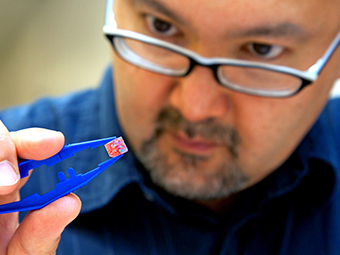Document Type
Article
Publication Date
10-23-2023
Abstract
Highlights
-
KCK tag can alter protein properties both quantitatively and qualitatively
-
Electrostatic interactions between the KCK tag and DNA contribute to the artifacts
-
Adding a short peptide tag to ParB protein does not lead to its in vivo changes
-
Single-molecule DNA flow-stretching assay can detect protein property changes
Motivation
Single-molecule fluorescence microscopy has been extensively used in modern biology to define the molecular action of proteins. Appending short peptide tags is a common strategy to enhance fluorescence labeling. Here, we evaluate the impact of a commonly used tag, the lysine-cysteine-lysine (KCK) tag, on protein behavior in single-molecule DNA flow-stretching assay, which is a sensitive and versatile method to understand the action of DNA-binding proteins. Our motivation is to provide researchers with an experimental framework to validate fluorescently labeled DNA-binding proteins in single-molecule methods.
Motivation: Single-molecule fluorescence microscopy has been extensively used in modern biology to define the molecular action of proteins. Appending short peptide tags is a common strategy to enhance fluorescence labeling. In this Resources article, we evaluate the impact of a commonly used tag, the lysine-cysteine-lysine (KCK) tag, on protein behavior in single-molecule DNA flow-stretching assay, which is a sensitive and versatile method to understand the action of DNA-binding proteins. Our motivation is to provide researchers with an experimental framework to validate the fluorescently labeled DNA-binding proteins in single-molecule methods.
Summary
Due to the enhanced labeling capability of maleimide-based fluorescent probes, lysine-cysteine-lysine (KCK) tags are frequently added to proteins for visualization. In this study, we employed an in vitro single-molecule DNA flow-stretching assay as a sensitive way to assess the impact of the KCK tag on the property of DNA-binding proteins. Using Bacillus subtilis ParB as an example, we show that, although no noticeable changes were detected by in vivo fluorescence imaging and chromatin immunoprecipitation (ChIP) assays, the KCK tag substantially altered ParB’s DNA compaction rates and its response to nucleotide binding and to the presence of the specific sequence (parS) on the DNA. While it is typically assumed that short peptide tags minimally perturb protein function, our results urge researchers to carefully validate the use of tags for protein labeling. Our comprehensive analysis can be expanded and used as a guide to assess the impacts of other tags on DNA-binding proteins in single-molecule assays.
Recommended Citation
Molina, Miranda, Lindsey E. Way, Zhongqing Ren, Qin Liao, Bianca Guerra, Brandon Shields, Xindan Wang, and HyeongJun Kim. "A framework to validate fluorescently labeled DNA-binding proteins for single-molecule experiments." Cell reports methods 3, no. 10 (2023). https://doi.org/10.1016/j.crmeth.2023.100614
Creative Commons License

This work is licensed under a Creative Commons Attribution-NonCommercial-No Derivative Works 4.0 International License.
Publication Title
Cell Reports Methods
DOI
10.1016/j.crmeth.2023.100614
Included in
Astrophysics and Astronomy Commons, Medicine and Health Sciences Commons, Physics Commons



Comments
Under a Creative Commons license